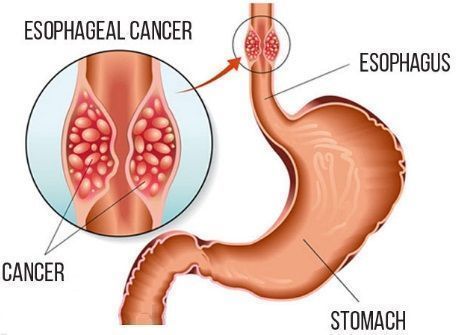Eesophageal cancer: Keytruda+ chemotherapy will be approved in EU
- Why Botulinum Toxin Reigns as One of the Deadliest Poisons?
- FDA Approves Pfizer’s One-Time Gene Therapy for Hemophilia B: $3.5 Million per Dose
- Aspirin: Study Finds Greater Benefits for These Colorectal Cancer Patients
- Cancer Can Occur Without Genetic Mutations?
- Statins Lower Blood Lipids: How Long is a Course?
- Warning: Smartwatch Blood Sugar Measurement Deemed Dangerous
First-line immunotherapy for esophageal cancer: Merck’s Keytruda+ chemotherapy regimen will be approved in the EU: it will become a new standard for first-line treatment!
Eesophageal cancer: Keytruda+ chemotherapy will be approved in EU. Merck & Co recently announced that the European Medicines Agency (EMA) Committee for Medicinal Products for Human Use (CHMP) has issued a positive review opinion recommending the approval of the anti-PD-1 therapy Keytruda (common name: pembrolizumab, Pembrolizumab), combined with chemotherapy (platinum + fluoropyrimidine), first-line treatment of locally advanced unresectable or metastatic esophageal cancer or HER2-negative gastroesophageal junction with tumors expressing PD-L1 (combined with a positive score [CPS]≥10) (GEJ) Adult patients with adenocarcinoma. In the key phase 3 KEYNOTE-590 trial, regardless of histology or PD-L1 expression status, Keytruda+ chemotherapy significantly prolonged overall survival (OS) and progression-free survival (PFS) compared with chemotherapy.
Now, CHMP’s opinions will be submitted to the European Commission (EC) for review, which will usually make an approval decision within the next 2 months. If approved, the Keytruda+ chemotherapy regimen will change the current first-line treatment of patients with locally advanced, unresectable or metastatic esophageal or GEJ cancer.
Dr. Scot Ebbinghaus, vice president of clinical research at Merck Research Laboratories, said: “The current 5-year survival rate for patients with metastatic esophageal cancer is only 5%. There is an urgent need for new treatment options with the potential to prolong life in the first-line environment. Today, CHMP treats Keytruda. The positive review of the opinions is an important step forward for European patients with certain types of gastrointestinal cancer.”
In March of this year, the US FDA has approved Keytruda combined chemotherapy (platinum + fluoropyrimidine) as the first-line treatment for patients with metastatic or locally advanced esophageal cancer or GEJ adenocarcinoma who are not suitable for surgical resection or radical radiotherapy. In China, Keytruda is approved as a monotherapy, a second-line treatment for patients with recurrent locally advanced or metastatic esophageal squamous cell carcinoma (ESCC) whose tumors express PD-L1 (CPS≥10).
Currently, Merck is continuing to study the therapeutic potential of Keytruda in various environments and stages of gastrointestinal cancer through its extensive clinical projects, including gastric cancer, hepatobiliary cancer, esophageal cancer, pancreatic cancer, colorectal cancer, anal cancer, etc.

Esophageal cancer (picture source: medindia.net)
CHMP’s positive review opinions are based on data from the key Phase 3 KEYNOTE-590 trial (NCT03189719). The trial evaluated Keytruda combined with chemotherapy (cisplatin + 5-fluorouracil [5-FU]) in the first-line treatment of patients with locally advanced unresectable or metastatic esophageal cancer and GEJ cancer.
The data shows that in the entire study population (intent-to-treat population [ITT]), regardless of histology or PD-L1 expression status, compared with chemotherapy, Keytruda + chemotherapy: (1) significantly prolonged overall survival (median OS: 12.4 months vs 9.8 months), reducing the risk of death by 27% (HR=0.73; 95%CI: 0.62-0.86; p<0.0001); (2) Significantly prolonging progression-free survival (median PFS: 6.3 months) vs 5.8 months), reduce the risk of disease progression or death by 35% (HR=0.65; 95%CI: 0.55-0.76; p<0.0001); (3) Significantly improve the objective response rate (ORR: 45.0% vs 29.3%) , Prolonged the duration of remission (median DOR: 8.3 months vs 6.0 months). In this study, the safety of Keytruda is consistent with previous research reports.
Esophageal cancer is an aggressive and devastating malignant tumor with a high mortality rate. There are few other treatment options besides chemotherapy. For newly diagnosed and previously untreated patients, there is an urgent need for treatment progress.
According to the results of the KEYNOTE-590 trial, Keytruda is the first anti-PD-1 therapy that combines chemotherapy in the first-line treatment of esophageal cancer and shows superior OS, PFS, ORR efficacy compared with current standard-of-care chemotherapy, regardless of tumor histology or PD-L1 Express the status.
Esophageal cancer is a particularly difficult-to-treat cancer that grows from the inner lining (mucosa) of the esophagus. There are two main types of esophageal cancer: squamous cell carcinoma and adenocarcinoma. Globally, esophageal cancer is the seventh most commonly diagnosed cancer and the sixth leading cause of cancer death. It is estimated that in 2018, there were more than 572,000 new cases of esophageal cancer worldwide and nearly 509,000 deaths. In China, esophageal cancer is the fifth most common cancer and the fourth leading cause of cancer death. 90% of esophageal cancers are squamous cell carcinomas.
Keytruda belongs to PD-(L)1 tumor immunotherapy, which helps detect and fight tumor cells by improving the ability of the human immune system. Keytruda is a humanized monoclonal antibody that blocks the interaction between PD-1 and its ligands PD-L1 and PD-L2, thereby activating T lymphocytes that may affect tumor cells and healthy cells.
Up to now, more than 10 PD-(L)1 tumor immunotherapies have been approved for marketing globally. Keytruda is the leader in this field and has approved multiple therapeutic indications. In 2020, global sales will reach 14.38 billion. The US dollar increased by 30% over the previous year.
Merck has the industry’s largest immuno-oncology clinical development project. There are currently more than 1,400 clinical trials investigating the role of Keytruda in multiple types of tumors and treatment settings. The Keytruda clinical project aims to understand the role of the drug in cancer and the factors that may predict patients’ benefit from Keytruda treatment, including the exploration of several different biomarkers.
(source:internet, reference only)
Disclaimer of medicaltrend.org



